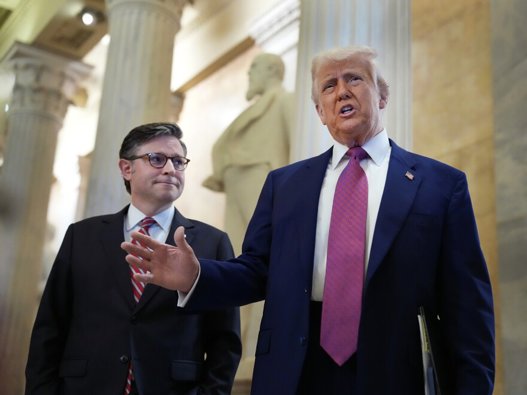
Conservatives Threaten Trump Bill Over Deficit, Medicaid
Conservative lawmakers warn Trump’s major bill could fail in the House over deficit and Medicaid concerns.
House Freedom Caucus Raises Red Flags on Senate Bill
President Donald Trump’s signature legislative effort, the “big, beautiful bill,” is facing renewed resistance from members of the conservative House Freedom Caucus as it makes its way through Congress. On Sunday, key Freedom Caucus members publicly criticized the Senate’s version of the bill, claiming it would add $1.3 trillion to the federal deficit compared to a much smaller increase under the House’s original proposal.
According to Reps. Ralph Norman of Texas and Eric Burlison of Missouri, the Senate bill’s fiscal impact is significantly higher than what was negotiated in the House. “Even without interest costs, it is $651 billion over our agreed budget framework,” they said in a statement. The Senate plan includes measures such as a $25 billion rural hospital fund and a permanent extension of certain tax cuts from the 2017 Tax Cuts and Jobs Act, which the House bill only extended temporarily. Additional provisions, like a tax break for whalers, are aimed at securing support from specific senators.
The Senate is operating under the “current policy baseline,” which assumes certain tax cuts are already policy and calculates their cost as revenue-neutral. However, House conservatives remain skeptical. Both Norman and Burlison warned that the bill could fail in a key House procedural vote unless the Senate adopts significant changes, including a high-profile amendment by Sen. Rick Scott of Florida. This amendment would reduce the federal government’s Medicaid contribution for states that expanded the program under the Affordable Care Act, potentially saving hundreds of billions more in federal spending.
Legislative Path Uncertain as Key Amendments Loom
Norman stated, “If it gets through [the House Rules Committee], I don't think it survives on the floor in the current form it's in. You know, we told the senators that. They knew this all along.” He added that while Speaker Mike Johnson has done a “good job,” the Senate needs to comply more closely with the House version to secure passage. Burlison predicted the bill could be “killed” in the House-wide rule vote if Scott’s amendment, or similar spending reductions, is not included.
Several Freedom Caucus members have publicly called on Senate Republicans to support Scott’s Medicaid amendment. Meanwhile, a GOP aide emphasized that the Senate version generates more Byrd-compliant savings—a requirement for budget reconciliation—than the House bill, and that it correctly scores the permanent tax cuts as revenue-neutral. According to the White House Council of Economic Advisers, the bill could drive $4.1 trillion in economic growth, outpacing the House version’s projections.
Senate Republicans maintain the legislation would cut $1.6 trillion in spending over ten years, surpassing the $1.5 trillion benchmark set by House conservatives. However, absent key amendments, the bill’s prospects in the House remain in doubt as lawmakers race to finalize a package for President Trump’s signature by July 4.






